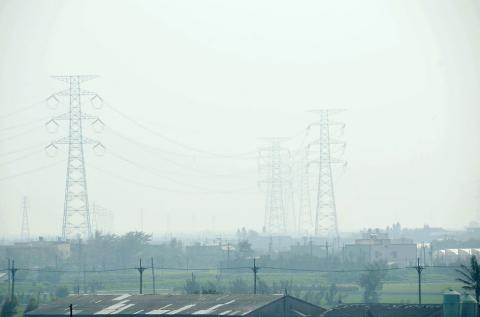Central Taiwan might be designated a top-grade air pollution control zone, while a Taichung City bylaw aiming to limit coal burning to curb air pollution might be approved by the central government next week, the Environmental Protection Administration (EPA) said.
At a meeting of the legislature’s Social Welfare and Environmental Hygiene Committee yesterday, EPA Minister Wei Kuo-yen (魏國彥) said that by the end of this year, Taichung, Changhua and Nantou might be designated as class-three air pollution control zones, where pollution is most severe according to the agency’s three-class categorization system.
The area was identified for potential designation as a class-three zone due to high concentrations of PM2.5 — fine particulate matter measuring 2.5 micrometers or less in diameter — Wei said, in response to New Power Party Legislator Hung Tzu-yung’s (洪慈庸) questions about an emissions cap in the area to curb pollution.

Photo: CNA
An area where air quality levels fall below the standard for three consecutive years can be recognized as a class-three air pollution zone, in which stricter standards apply to reduce emissions in the area.
According to an analysis of PM2.5 data collected in the past three years and announced by the EPA earlier this year, the whole nation, excluding Hualien and Taitung, qualify for class-three zone recognition.
Hung also asked whether the EPA would reject a Taichung bylaw to ban petroleum coke and reduce the use of coal in the city by 40 percent in four years, as the agency last year rejected a similar Yunlin bylaw that aimed to ban coal burning.
The EPA said the ban was beyond the county’s jurisdiction.
“The Taichung bylaw and Yunlin bylaw are different in content. The Taichung bylaw is less in conflict with central government laws and is likely to be approved. The EPA will submit an analysis of the Taichung bylaw to the Executive Yuan for review next week,” Wei said.
In related news, Democratic Progressive Party Legislator Liu Chien-kuo (劉建國) said participants of religious activities are at higher risk of PM2.5 exposure, as PM2.5 levels inside a temple that burns incense and ghost money could be three times higher than the highest level of the EPA’s 10-level PM2.5 index.
As a series of festivals celebrating Matsu are scheduled to begin soon, Liu called on the EPA to dispatch air quality monitoring vehicles to join religious processions and announce real-time pollution data and associated health risks of different religious activities, such as letting off firecrackers and burning incense.
“According to an EPA study, incense emits 75 to 700 micrograms of PM2.5 per cubic meter, which is 10 times higher than the highest level of the EPA’s PM2.5 index. I will personally join the processions and monitor air quality with a handheld device,” Wei said.

MAKING WAVES: China’s maritime militia could become a nontraditional threat in war, clogging up shipping lanes to prevent US or Japanese intervention, a report said About 1,900 Chinese ships flying flags of convenience and fishing vessels that participated in China’s military exercises around Taiwan last month and in January last year have been listed for monitoring, Coast Guard Administration (CGA) Deputy Director-General Hsieh Ching-chin (謝慶欽) said yesterday. Following amendments to the Commercial Port Act (商港法) and the Law of Ships (船舶法) last month, the CGA can designate possible berthing areas or deny ports of call for vessels suspected of loitering around areas where undersea cables can be accessed, Oceans Affairs Council Minister Kuan Bi-ling (管碧玲) said. The list of suspected ships, originally 300, had risen to about

DAREDEVIL: Honnold said it had always been a dream of his to climb Taipei 101, while a Netflix producer said the skyscraper was ‘a real icon of this country’ US climber Alex Honnold yesterday took on Taiwan’s tallest building, becoming the first person to scale Taipei 101 without a rope, harness or safety net. Hundreds of spectators gathered at the base of the 101-story skyscraper to watch Honnold, 40, embark on his daredevil feat, which was also broadcast live on Netflix. Dressed in a red T-shirt and yellow custom-made climbing shoes, Honnold swiftly moved up the southeast face of the glass and steel building. At one point, he stepped onto a platform midway up to wave down at fans and onlookers who were taking photos. People watching from inside

Japan’s strategic alliance with the US would collapse if Tokyo were to turn away from a conflict in Taiwan, Japanese Prime Minister Sanae Takaichi said yesterday, but distanced herself from previous comments that suggested a possible military response in such an event. Takaichi expressed her latest views on a nationally broadcast TV program late on Monday, where an opposition party leader criticized her for igniting tensions with China with the earlier remarks. Ties between Japan and China have sunk to the worst level in years after Takaichi said in November that a hypothetical Chinese attack on Taiwan could bring about a Japanese

The WHO ignored early COVID-19 warnings from Taiwan, US Deputy Secretary of Health and Human Services Jim O’Neill said on Friday, as part of justification for Washington withdrawing from the global health body. US Secretary of State Marco Rubio on Thursday said that the US was pulling out of the UN agency, as it failed to fulfill its responsibilities during the COVID-19 pandemic. The WHO “ignored early COVID warnings from Taiwan in 2019 by pretending Taiwan did not exist, O’Neill wrote on X on Friday, Taiwan time. “It ignored rigorous science and promoted lockdowns.” The US will “continue international coordination on infectious